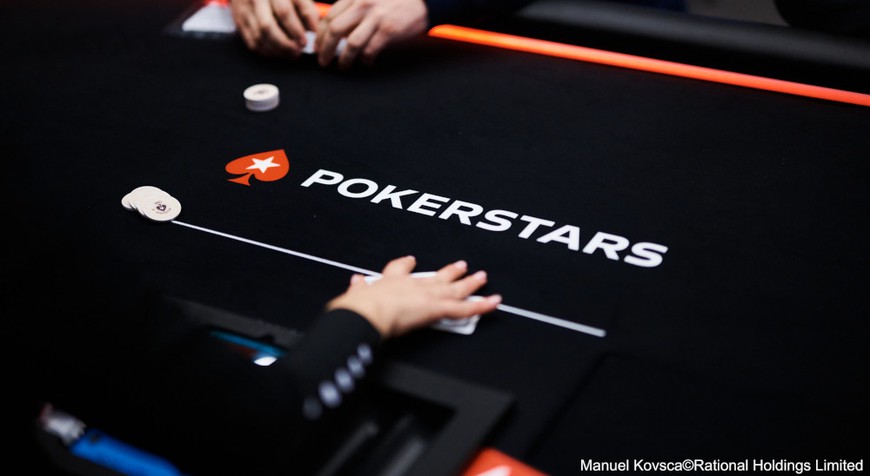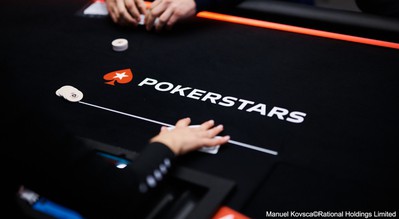

PokerStars is rolling out a series of updates to its live tournament rules, starting with the upcoming EPT Monte Carlo festival kicking off on April 30.
The changes were revealed in an exclusive interview with EPT Tournament Director Toby Stone during the recently concluded Irish Poker Open.
From seating rules to restriction of smart devices, these updates aim to improve fairness, eliminate potential for abuse, and bring consistency across PokerStars’ live tournament offerings. Most notably, a couple of of these changes have been prompted by direct feedback from players.
Here’s a quick summary of the key changes:
- Fixed Hands Per Level at Final Tables (instead of time-based levels)
- Slide Dealing Expansion — Phased rollout, fully live from EPT Barcelona
- Expanded Smart Device Restrictions — Now covering smart glasses, rings, etc.
- Stricter Seating Rules — New players must sit immediately when arriving to the table
- Shot Clock Tweaks — Begins at Level 11 in hyper-turbo tournaments
While most changes will take effect from EPT Monte-Carlo, one—Slide Dealing—will see a full rollout starting at EPT Barcelona in August 2025. The changes will be implemented in all PokerStars live tournament offerings, pokerfuse understands, including satellites.
Final Tables to Use Hands-Per-Level Structure
PokerStars is replacing timed levels with a hands-per-level format at all final tables. Instead of blinds increasing after a set time, like 90 minutes, they will now go up after a fixed number of hands. This will be implemented across all tournaments except qualifiers.
“When we reach the final table of all tournaments, we’re gonna move to a hands-per-level blinds structure rather than a time structure,” explains Stone. “We’re just going to say after X number of hands, the blinds will go up.”
Stone says the change improves fairness and strategy. “Players can better plan their strategy, knowing exactly how many blinds they’re going to pay. Every player experiences the same number of hands per level, which eliminates advantages caused by faster or slower play.”
The move also tackles stalling, which Stone strongly opposes. “It prevents players from stalling to make sure somebody else plays a bigger blind, which is one of my pet peeves. So many people see it as a genuine strategy, but I think it’s an abuse of time. You should take the time it takes you to make a decision, and once that decision is made, you should act.”
While the change is limited to final tables for now, Stone admits he would “love” to implement it earlier—perhaps at two or three tables left—but acknowledges logistical challenges in doing so.
Slide Dealing
Another update is the wider adoption of slide dealing, a technique where cards are slid rather than pitched, something that PokerStars began testing last year in response to cheating concerns.
“Because of all the cheating scandals going on last year… we started slide dealing,” said Stone, confirming that the technique will now be used from start to finish in every event, excluding only accidental lapses.
To support the change, PokerStars has replaced all felts with “slide felt” and spent the past year training dealers. “Some of our dealers already knew how to do it, some didn’t,” Stone noted. “We’ve been basically training the dealers… helping them to learn how to slide.”
While the plan was to implement slide dealing from EPT Monte-Carlo 2025 fully, the cancellation of EPT Paris earlier this year created a training gap. As a result, a full rollout has been postponed to EPT Barcelona in August.
However, EPT Monte-Carlo will still see partial implementation, slide dealing will be used in every 10k or higher buy-in event, when players are in the money, and in select tournaments.
While opinions differ on whether sliding is faster or cleaner, Stone emphasized that the primary goal is integrity. “It’s really just preventing people [from] cheating with their phones and catching the cards,” he said.
Slide dealing is already common in parts of Europe, especially in the UK, where it’s considered standard practice.
Smart Devices Under Scrutiny
PokerStars is also tightening its restrictions around smart devices. While current rules already prohibit phones on the felt and forbid players from using them while in a hand, the revised policy goes further, explicitly banning the use of all smart accessories during play. This includes smart rings, glasses, and any other wearable technology capable of transmitting or receiving data.
The goal, he said, is to limit potential cheating devices as much as possible, even if enforcement is tricky.
Interestingly, Stone made it clear that the operator has no plans to ban phones entirely from the table area. “We tried that before, a few years ago, and we failed,” he said. “The players really want their phone on the table.”
However, he added that they may consider restrictions later in the tournament, similar to what Wynn has implemented. “We may do what the Wynn has done when you get to X number of tables, or when you get into the money, then you’re not allowed to use your phone,” he said, noting the idea is still under consideration and not yet confirmed.
Stricter Seating Enforcement
PokerStars is also tightening its seating rules to curb players from gaining an unfair advantage by hovering near the table. Under the new rule, players must immediately take their assigned seat upon arriving at the table—no lingering, standing, or watching the action is allowed.
The rule is meant to address situations where players hover near the table to avoid blinds or gain information before joining the action. “I think that you shouldn’t get the benefit of knowing the action unless you’re actually sat there,” Stone explained. “It’s kind of a little bit immoral… they’re mostly doing this to try to miss the blinds.”
To enforce the rule, tournament staff will step in when necessary. “We will just force them to sit down,” Stone said.
Shot Clock Tweaks
Finally, a minor but noteworthy tweak is coming to hyper tournaments. The shot clock, which forces players to act within a set amount of time, will now begin at Level 11.
Players will receive two 10-second time bank cards at the start of level 11, with another two issued at the next break, if one occurs. “It wouldn’t be more than two breaks after that,” Stone added, meaning a maximum of four time bank cards in most cases.
Stone says this new ruling comes in response to player feedback.
These aren’t the first changes that the operator has made in the name of game integrity. Last year, the EPT introduced a rule explicitly banning the use of GTO solvers, charts, AI tools, or similar software at the table—or anywhere in the tournament room, even by spectators. That move came in the wake of controversy at the 2024 WSOP Main Event Final Table, where a player’s rail was accused of using solver tools during heads-up play. (Read our interview about that incident here.)
Now, PokerStars is rolling out another wave of updates aimed at closing loopholes and reinforcing fairness, from tighter rules around smart devices and table behavior to subtle tweaks like shot clock timing. These changes will go into effect at the next EPT stop in Monte Carlo, which kicks off on April 30, 2025.

